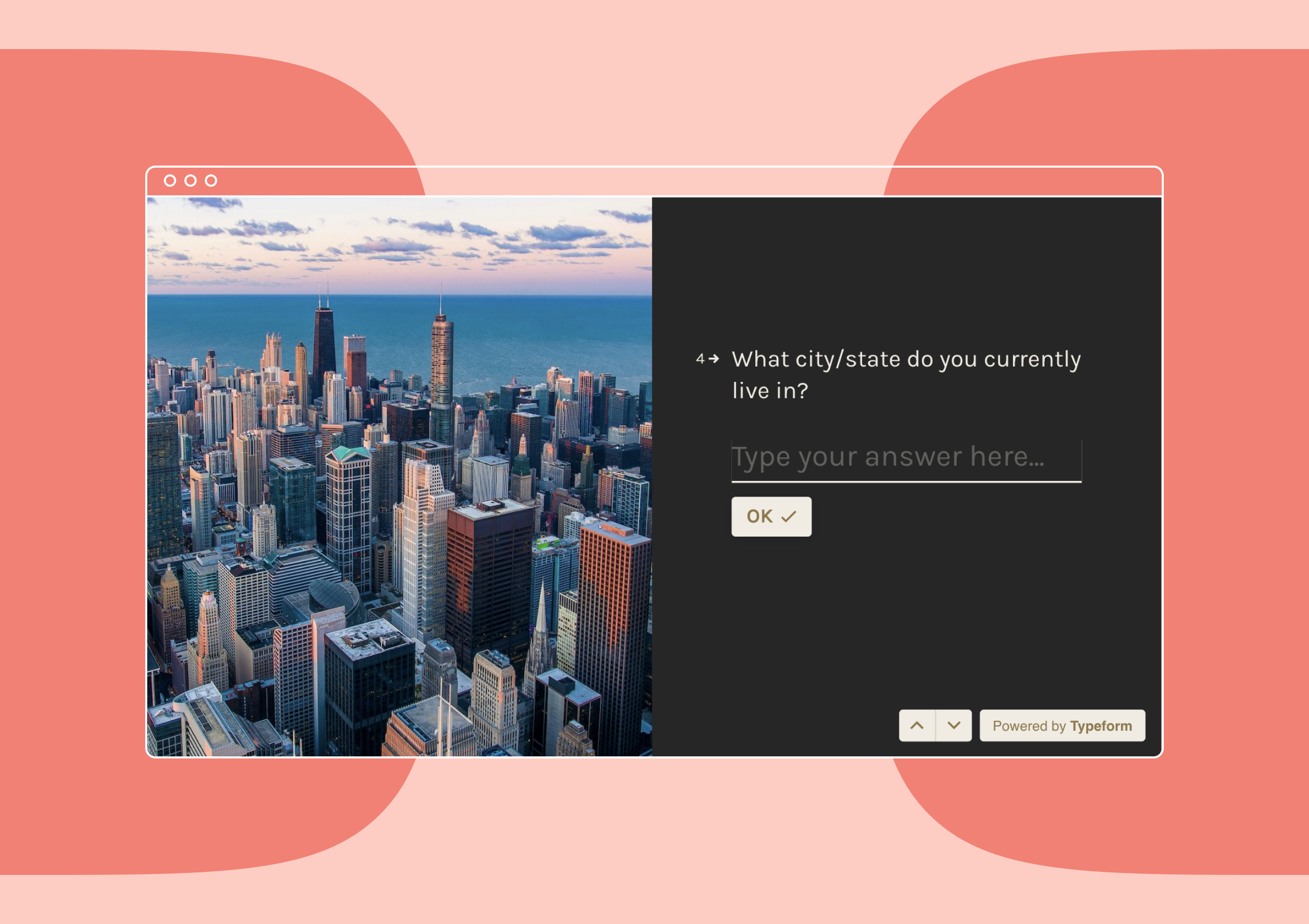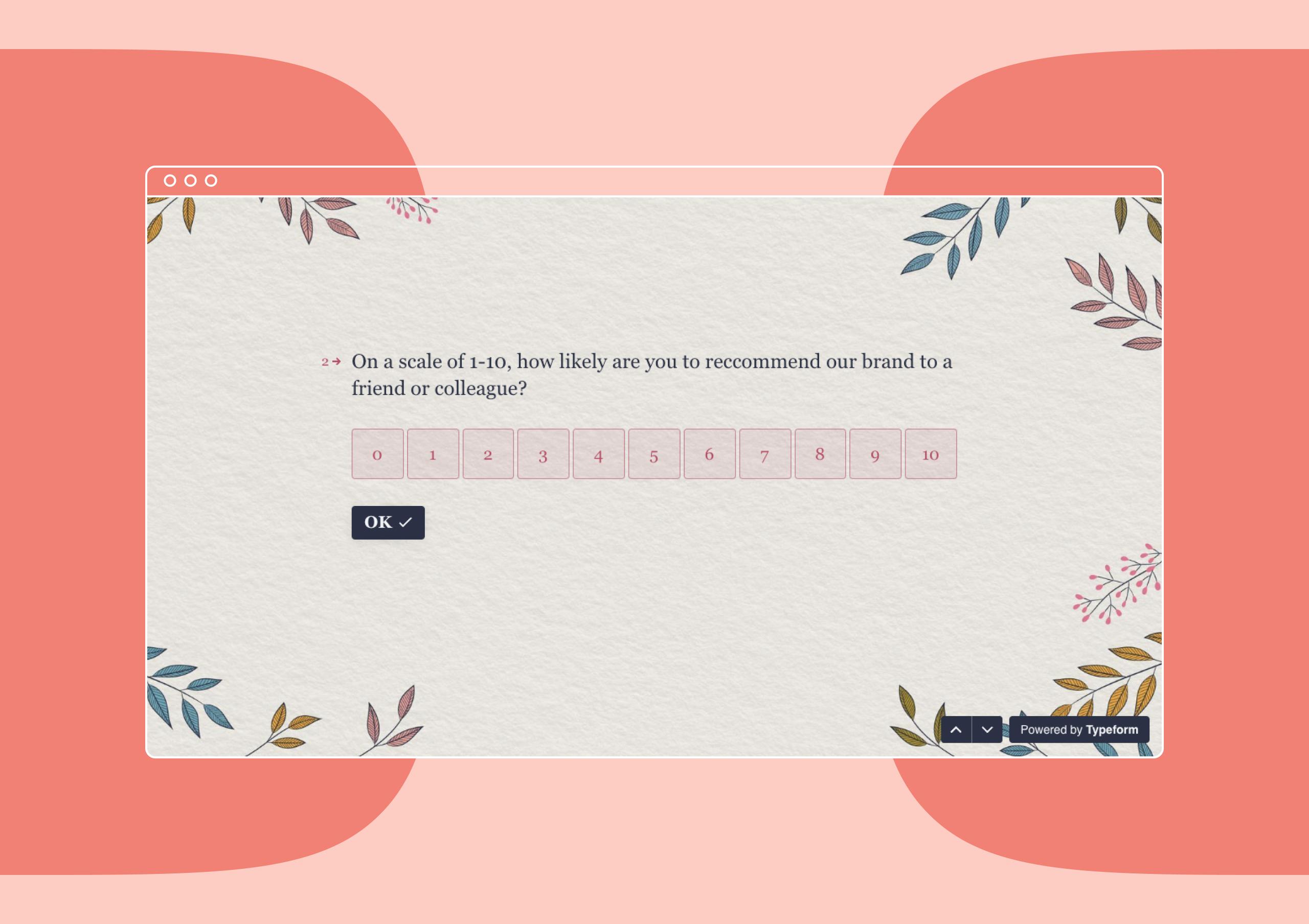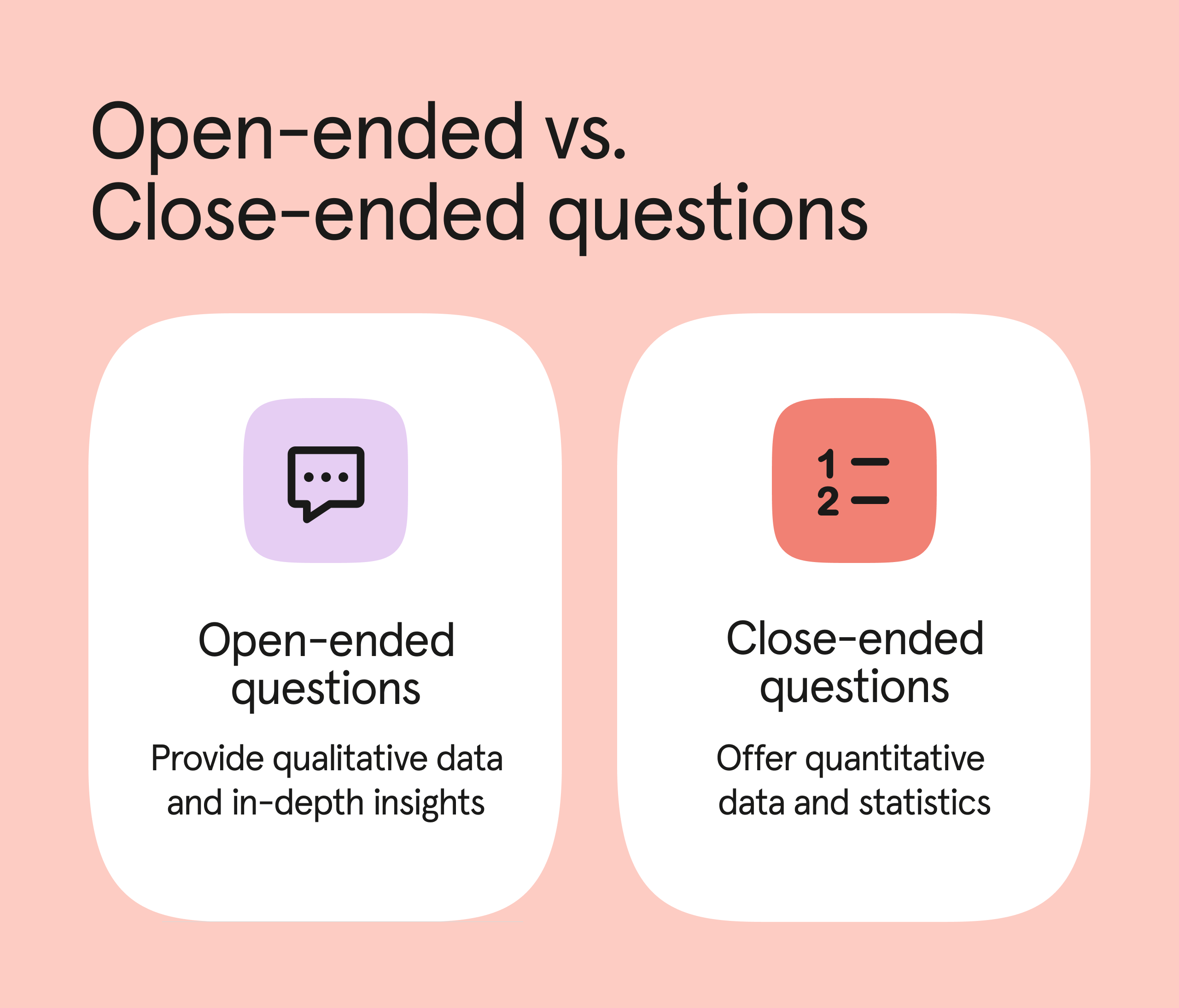Tips
20 essential brand perception survey questions + template
Brand perception survey questions help you gauge the strengths and weaknesses of your brand’s image. Discover what to ask on your next brand perception survey.

When you hear the brand name Apple, what comes to mind? Cutting-edge, sleek, and top-of-the-line are just a few of the words and phrases commonly associated with the tech giant. From soccer moms to business execs, many people share the same sentiments about this brand because of the work it' s put into its brand perception.
Brand perception is (surprise, surprise) how your audience perceives your brand, which can influence their purchasing decisions and, ultimately, your business’s success or failure. And, like any great marketing endeavor, fine-tuning your brand perception takes solid market research.
To start crafting your survey, check out these brand perception survey questions that won’t just tell you who you are now but what your brand can be.
1. What’s your age/gender/location/etc.?
Measures: Audience research
Understanding your audience' s demographics helps you tailor your marketing strategies to specific groups and identifies the customer segments most interested in your brand. Demographic survey questions allow you to craft laser-focused campaigns that resonate with specific groups, ensuring your message hits the mark and doesn' t get lost in the noise.
2. Have you heard of our brand before?
Measures: Brand awareness
Before you get into the meat of your survey, you should probably ask whether your participant even knows who you are.
This question is fundamental in assessing the extent of brand awareness and visibility. It provides a baseline understanding of how well your audience recognizes your brand and serves as a starting point to gauge the effectiveness of your marketing efforts.
3. How did you first learn about our brand?
Measures: Brand awareness
Asking survey participants how they first heard about your brand sheds some much-needed light on your marketing landscape. It not only reveals the most successful first-touch channels but also uncovers the dark corners that need a little extra illumination.
This question provides vital insights for refining your marketing strategies, directing resources to the most effective channels, and fine-tuning your approach to enhance brand discovery and engagement.
4. Can you name our main competitors in the industry?
Measures: Competitor awareness
It’s not enough to know whether your audience is familiar with your brand—to fully assess the level of brand awareness, you should also ask whether they’re familiar with your competitors.
This insight is essential in understanding where you stand in relation to your competitors. Armed with this knowledge, you can craft marketing strategies that emphasize your unique selling points, differentiate your brand, and communicate your strengths in a way that resonates with your audience and strengthens your market position.
5. What do you believe sets us apart from competitors?
Measures: Brand differentiation
Every brand has a unique selling point that sets it apart from the competition, but it’s not always obvious. Asking your audience what they believe are your brand’s unique qualities not only sheds light on the competition from their perspective but helps you understand what potential customers value as distinctive.
With this knowledge, you can position your brand more effectively in the market by aligning your messaging and strategies with the attributes that matter most to your target audience.
6. How likely are you to purchase from our brand within the next six months?
Measures: Purchase intent
Inquiring about how likely your survey participants are to purchase from you not only measures the immediate sales potential but also offers valuable insights into the likelihood of conversion and the effectiveness of your marketing strategies.
This question helps you identify potential customers on the cusp of making a decision, allowing you to tailor your efforts to nurture those prospects and secure future sales.
7. Do you believe our products or services are priced fairly?
Measures: Price perception
You might believe your offerings are worth a million bucks, but your brand’s premium price tags may turn off your target audience. Asking survey respondents to rate the value of your products or services for the price provides a direct line to understanding how customers perceive your value proposition.
With this data, you can gauge whether your pricing aligns with customer expectations and whether you need to make adjustments to maintain competitiveness.
8. Have you ever used our products/services before?
Measures: Usage and interaction
Just because they’ve heard about your brand doesn’t mean they’ve already made their merry way through your sales funnel.
Asking this question is essential because it helps you determine the level of consumer interaction with your brand. Responses to this question let you know whether survey participants have engaged with your products or services or if they’ve hit a snag along the customer journey.
9. How would you rate the quality and reliability of our products/services?
Measures: Quality and reliability
Having survey participants rate the quality and reliability of your offerings is a linchpin in safeguarding and enhancing your brand reputation. It offers valuable feedback from customers about your brand' s strengths and weaknesses.
By addressing any shortcomings and amplifying strengths, you can maintain and elevate your reputation to build trust and loyalty among your audience.
10. How likely are you to continue using our products or services in the future?
Measures: Brand loyalty
Attracting new customers is only half the battle when it comes to building a successful brand—you need to keep those customers coming back for more. This brand perception survey question directly gauges brand loyalty and the depth of the customer relationship.
It offers a clear indication of whether your customers are not only satisfied with but also committed to your brand, reflecting their potential for repeat business. Knowing how likely your customers are to continue using your products or services provides valuable insights for retention strategies and can help forecast the long-term sustainability and growth of your brand.
11. How would you rate our customer service?
Measures: Customer service and support
With scathing Yelp reviews and rampant social media sharing, nothing can ruin a brand faster than poor customer service. Inquiring about yours is pivotal for assessing how effectively your brand meets customer needs and, in turn, gauging overall customer satisfaction. It acts as a direct feedback mechanism, shedding light on the critical touchpoints of the customer journey.
By understanding and addressing the quality of your customer service, you can enhance the overall customer experience, foster loyalty, and ensure your brand remains aligned with customer expectations.
12. How likely are you to recommend our brand to a friend or colleague?
Measures: Word-of-mouth marketing
Asking how likely your customers are to recommend your brand offers a glimpse into the potential for organic growth and word-of-mouth marketing.
When customers are willing to recommend your brand, they essentially become voluntary brand advocates. Their positive sentiment and endorsement can cause a powerful ripple effect as satisfied customers actively promote your products or services to their networks. It' s a testament to their trust and affinity for your brand, which can translate into increased visibility, customer acquisition, and long-term success.
13. How would you describe our brand in three words?
Measures: Brand association
Questions like, “How would you describe our brand in three words?,” “How would you describe our brand to a friend?,” or “What words or phrases come to mind when you think of our brand?” are great for understanding which core attributes and characteristics resonate most with your audience.
This condensed feedback is a gold mine of information because it reveals the top-of-mind associations people have with your brand. You can use these descriptors to inform and shape your brand messaging, ensuring it aligns with the attributes that matter most to your audience.
14. Do you feel our brand’s messaging aligns with your values and needs?
Measures: Brand messaging
Just like a game of telephone, the underlying meaning behind a marketing campaign can often get lost in translation.
Asking your audience whether or not they feel your messaging aligns with their values serves as a vital checkpoint in understanding the harmony between your brand' s messaging and your customers' expectations. It' s not enough for brand messages merely to inform; they should also resonate with the values and needs of the intended audience.
The response to this question can unveil whether your messaging strikes the right chord and whether customers perceive your brand as a solution that aligns with their values and requirements.
15. How do you perceive our brand’s online presence (websites, social media, etc.)?
Measures: Online presence and perception
Knowing how your audience views and interacts with your online persona is necessary in today’s digital age—after all, your brand’s online presence is the first point of contact for many consumers.
Their perception of your website, social media profiles, and other online assets can significantly impact their overall brand perception. Feedback on this aspect is indispensable for staying relevant and competitive in the online arena, as it allows you to make necessary improvements to align your digital strategy with your audience' s ever-evolving needs and preferences.
16. How effective is our brand when communicating with customers?
Measures: Brand communication
This brand perception survey question is your hotline to find out if your brand is an eloquent storyteller or if it' s muttering incoherent gibberish.
In today' s world, effective communication is a must for building lasting relationships with your audience. Responses to this question may be your cue to fine-tune your communication strategy, ensuring it' s not just speaking but truly engaging with your customers.
17. Have you noticed any changes in our brand offerings over time?
Measures: Brand evolution
Like a fine wine, your brand should evolve over time—but it’s crucial to keep a pulse on how your audience perceives those changes. Are they readily embracing the changes or struggling to connect the dots?
This question is your barometer, helping you understand how well your brand navigates through evolving market dynamics and customer tastes. It' s all about ensuring your brand remains in sync with ever-changing market conditions and customer preferences.
18. Have you ever provided feedback to our brand? If so, what was your experience?
Measures: Customer feedback
Asking customers about their experiences by providing feedback on your brand is instrumental in gauging your brand’s responsiveness and commitment to improvement.
The responses to this question can tell you if you’re hearing customers’ suggestions or concerns and acting on their insights. Customer feedback is crucial for driving meaningful changes within your brand. While we can’t implement those changes for you, our customer survey feedback tool makes it easy for customers to share their thoughts and feelings with your brand.
19. What' s your overall impression of our brand?
Measures: Overall brand impression
One of the final questions in your brand perception survey should cover participants' overall impression of your brand. It' s a condensed yet crucial question that’ll provide a snapshot of your audience' s general sentiment and perception.
20. Is there anything else you' d like to share about your perception of our brand?
Measures: Qualitative data
While structured questions serve as the backbone of a brand perception survey, wrapping up with an open-ended query lets customers express their thoughts and feelings in their own words.
This question captures the nuances, unique experiences, and unexpected insights that structured questions can miss. It allows customers to:
- Raise concerns
- Share personal stories
- Highlight exceptional encounters
- Offer suggestions and ideas
This qualitative data can be a treasure trove for understanding the subtle aspects of brand perception, offering valuable context that can lead to improvements, innovation, and enhanced customer satisfaction.
What is a brand perception survey?
Brand perception surveys are powerful tools that give insight into how current customers, potential customers, and the public perceive your brand—think of it as a mirror reflecting your brand’s image in the eyes of your audience.
This survey typically consists of a series of questions aimed at assessing various aspects of the brand, such as:
- How recognizable it is (awareness)
- What people think of it (reputation)
- How customers would rate it (quality)
- How helpful it is to customers (customer service)
The magic of brand perception surveys lies in their ability to provide a clear, data-driven understanding of your brand' s strengths and weaknesses. They help you uncover areas where your brand excels and pinpoint areas of improvement, allowing you to tailor strategies to address any issues that may be tarnishing your brand’s reputation.
By aligning your brand with your target audience' s perceptions and expectations, a well-executed brand perception survey can lead to increased customer loyalty, stronger market positioning, and, ultimately, greater business success.
How to run a brand perception survey
Leave the cookie cutter in the kitchen if you want to put together a successful brand perception survey.
Your brand' s unique audience and goals will affect how you format your questions, distribute your survey, and analyze the data you collect. Here’s a quick guide to making the most of your brand perception survey:
Know what questions to ask
If you’re looking to gauge how your social media presence is fairing, you probably don’t need to be asking 20 questions about the usability of your product. Crafting the right set of questions is the cornerstone of running a successful brand perception survey, but it depends on your goals.
Start by defining the specific insights you aim to gather. What aspects of your brand perception are most critical? These could include brand awareness, reputation, product quality, customer service, or any other attributes relevant to your brand.
Once you' ve identified your objectives, design a series of clear, concise, and well-structured questions that align with those objectives. Open-ended questions can provide in-depth insights, while closed-ended questions with rating scales can offer quantitative data you can quickly analyze. Strike a balance between the two to gain a comprehensive understanding of your brand' s perception.
Determine the best method to run your survey
The survey method you choose significantly impacts the quality and quantity of responses you receive.
There are several effective brand perception survey methods to choose from, including:
- Online surveys: Administered through web-based platforms, these are cost-effective and can reach a broad audience.
- Email questionnaires: Distributed via email, these surveys are convenient for reaching a specific customer base or email list.
- Phone interviews: This method provides a personal touch but may be more time-intensive.
- In-person surveys: Face-to-face interviews with respondents are often best for detailed or targeted research.
- Social media surveys: Utilize social platforms to engage with your audience and gather feedback.
- Mail-in surveys: Physical surveys sent through traditional mail may be more suitable for specific demographics or areas.
- In-app surveys: Surveys integrated into mobile apps are ideal for businesses with a mobile app user base.
- SMS surveys: Text message surveys are convenient for reaching a mobile-focused audience.
- Mystery shopping surveys: Use undercover shoppers to evaluate the customer experience and gather feedback.
Your choice should align with your target audience' s preferences and accessibility. For example, if your brand caters to a tech-savvy, online-focused audience, an online survey may be the most efficient choice. Conversely, if your audience is less tech-oriented, you may have better luck with phone interviews or in-person surveys.
Additionally, consider factors like the cost, time, and available resources for survey administration. Online surveys are often cost-effective and allow for quick data collection and analysis, while in-person surveys may require more significant time and budget commitments. Choose wisely!
Tailor your questions to each specific audience
To make the most of your research, it' s crucial to tailor your brand perception survey questions to suit each specific audience within your brand' s ecosystem. Your target audience, existing customers, cart abandoners, and other segments all hold unique perspectives and concerns.
You may need to create multiple surveys that cater to each audience segment. For example:
- Surveys sent to your target audience should gauge initial brand awareness and the factors influencing their purchasing decisions.
- Surveys targeting existing customers may inquire about their satisfaction levels, brand loyalty, and likelihood of referring your brand to others.
- Survey questions for cart abandoners should focus on pinpointing the obstacles that stopped them from completing the purchase, like price perception.
Customized questions create a personalized and relevant survey experience for each group, increasing the likelihood of meaningful, actionable feedback.
If you don’t have your audience segmented, that’s OK—you can use conditional logic with Typeform’s form builder so your respondents are only presented with the questions that are relevant to them.
Impress with Typeform
Brand perception surveys require minimum effort but can result in maximum payout. Whether you’re a legacy brand looking to dial in your marketing messaging or a startup gathering customer data for your first big advertising campaign, Typeform lets you create beautiful surveys that are customizable, on-brand, and more engaging than your typical online questionnaire.
Need a jumping-off point? Try adding your own spin on our brand perception survey template—we make it easy with over 1 million icons, videos, and photos to choose from (or you can upload your own).






.png)

